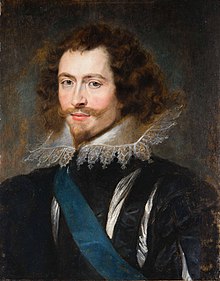
Back جورج فيليرز، دوق بكنغهام الأول Arabic Джордж Вільерс (1-ы герцаг Бакінгемскі) Byelorussian Джордж Вилиърс Bulgarian George Villiers Catalan George Villiers, 1. vévoda z Buckinghamu Czech George Villiers, Dug Buckingham 1af Welsh George Villiers, 1. hertug af Buckingham Danish George Villiers, 1. Duke of Buckingham German George Villiers Esperanto George Villiers (político inglés) Spanish
The Duke of Buckingham | |
|---|---|
 Portrait by Peter Paul Rubens, 1625 | |
| Master of the Horse | |
| In office 4 January 1616 – 23 August 1628 | |
| Monarchs | James VI and I Charles I |
| Preceded by | The Earl of Worcester |
| Succeeded by | The Earl of Holland |
| Lord High Admiral | |
| In office 28 January 1619 – 23 August 1628 | |
| Preceded by | The Earl of Nottingham |
| Succeeded by | Board of Admiralty |
| Lord Lieutenant of Buckinghamshire | |
| In office 16 September 1616 – 23 August 1628 | |
| Preceded by | Sir Francis Fortescue |
| Succeeded by | The Earl of Bridgewater |
| Lord Lieutenant of Middlesex | |
| In office 6 May 1622 – 23 August 1628 | |
| Preceded by | In commission |
| Succeeded by | The Earl of Dorset The Earl of Holland |
| Lord Lieutenant of Kent | |
| In office 31 May 1620 – 8 June 1620 | |
| Preceded by | The Lord Wotton |
| Succeeded by | The Duke of Lennox |
| Personal details | |
| Born | 20 August 1592 Brooksby, Leicestershire, England |
| Died | 23 August 1628 (aged 35) Portsmouth, Hampshire, England |
| Manner of death | Assassination |
| Resting place | Westminster Abbey |
| Spouse | Katherine Manners, Baroness de Ros |
| Children |
|
| Parents | |
| Relatives | Villiers family |
| Signature | |
George Villiers, 1st Duke of Buckingham, KG (/ˈvɪlərz/ VIL-ərz; 20 August 1592 – 23 August 1628),[1][2] was an English courtier, statesman, and patron of the arts. He was a favourite and self-described "lover" of King James VI and I.[3] Buckingham remained at the height of royal favour for the first three years of the reign of James's son, Charles I, until he was assassinated.
Villiers was born in Brooksby, Leicestershire from a family of minor gentry. His ascent began notably in 1614 when, aged 21, he caught the attention of the King. His achievements include being knighted and climbing the ranks of nobility, eventually becoming the Duke of Buckingham. Villiers was the last in a succession of handsome young favourites on whom the King lavished affection and patronage. The pair were often accused of sodomy[4] and most historians today believe the relationship was sexual in nature.[5][6]
Villiers' influence extended beyond the King's favour; he played a significant role in political and military affairs, including the negotiation of royal marriages and leading military expeditions. His tenure as Lord High Admiral and de facto foreign minister was marked by a series of failed military campaigns, such as the ill-fated Cádiz expedition (1625), which damaged his reputation and public image. Buckingham's assassination in 1628 by John Felton, a disgruntled army officer, highlighted the extent of his unpopularity among the public.
- ^ Montague-Smith 1970, p. 409.
- ^ Debrett's 2011.
- ^ Bergeron, David M. (2002). "4: George Villiers, Duke of Buckingham". King James and Letters of Homoerotic Desire. Iowa City: University of Iowa Press. ISBN 978-1587292729.
- ^ Perry, Curtis (2000). "The Politics of Access and Representations of the Sodomite King in Early Modern England". Renaissance Quarterly. 53 (4): 1054–1083. doi:10.2307/2901456. ISSN 0034-4338. JSTOR 2901456.
- ^ "Filled with 'a number of male lovelies': the surprising court of King James VI and I". BBC. 27 September 2017. Retrieved 21 January 2024.
- ^ Painter, Sean T. (2015). "Rex Fuit Elizabeth: Nunc Est Regina Jacobus (Elizabeth Was King Now James Is Queen)" (PDF). The Chico Historian. 25. California State University, Chico: 16. Archived from the original (PDF) on 29 April 2024. Retrieved 29 April 2024.